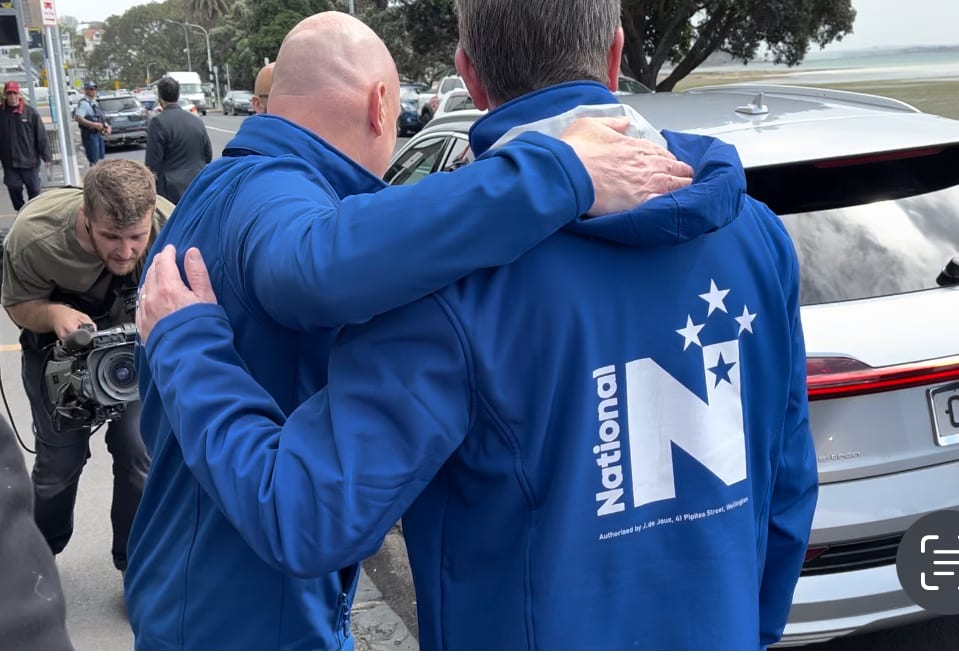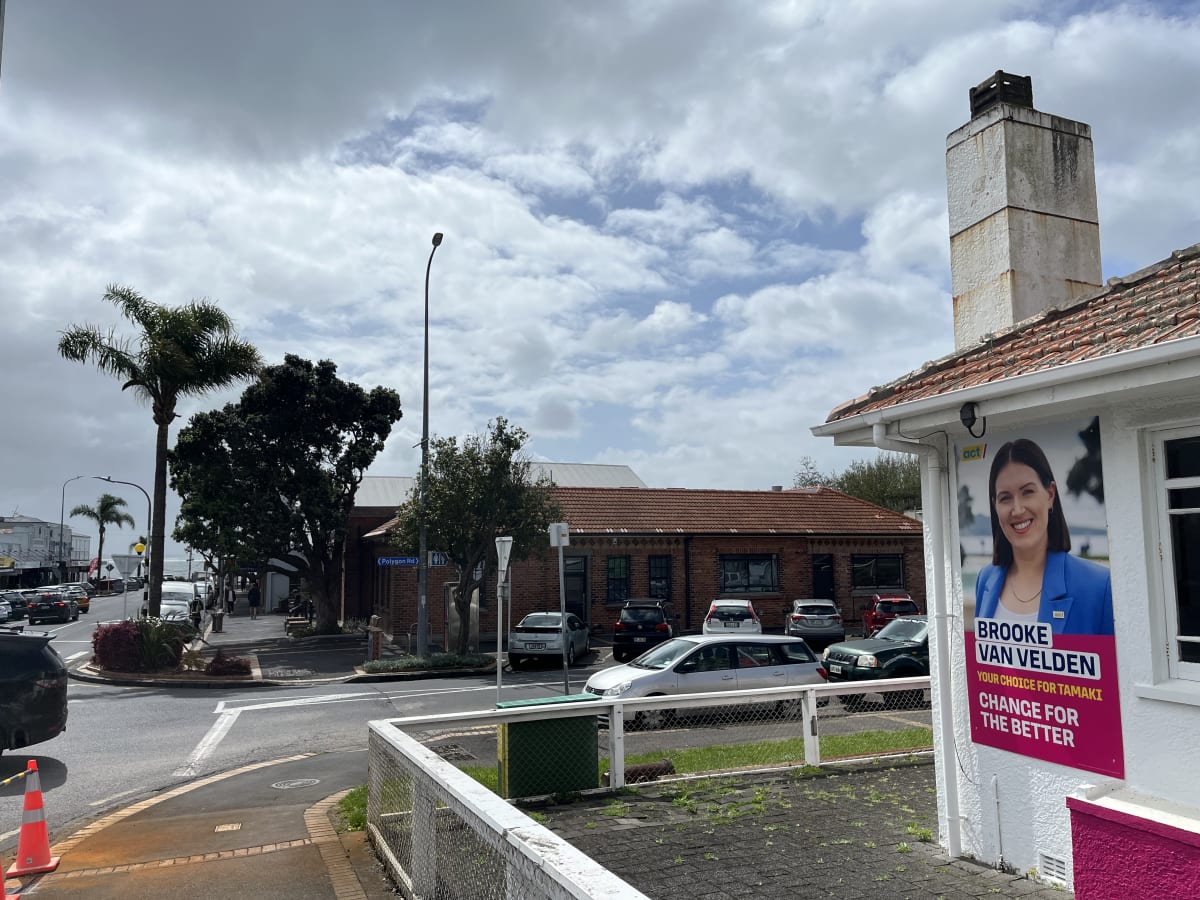
National has wheeled out its stars into the blue, blue seat of Tāmaki which is under friendly fire attack from Act deputy leader Brooke van Velden
First Bill English, then Christopher Luxon fronted within two days of each other for Simon O'Connor in the previously safe National heartland of the east Auckland bays.
English, the party leader and Prime Minister between 2016 and 2017, made a rare campaigning appearance on O'Connor's behalf to a party meeting of 100 or so at the Tāmaki Yacht Club on Wednesday.
On Friday afternoon, the current leader Christopher Luxon spent an hour on the streets of St Heliers village, talking O'Connor up and urging people to party vote National once advance voting begins on Monday October 2.
"When I came in [to Parliament in 2020] I learned a bit from Simon about how he does his local constituency causes and how he deals with people. He does a great job.
"He knows this community. You get a sense of that just being here today."

Asked if National was worried by the high-profile attack on the seat from Act's deputy leader Brooke van Velden, Luxon was emphatic: "No, not at all."
Even in the great red Labour wave of 2020, O'Connor won 52 percent of the electorate vote in the seat that has been in National's hands since 1960 when former Prime Minister Sir Robert Muldoon took it back from Labour's Bob Tizard. He's been MP for 12 years, courting controversy through his views on moral issues like abortion and also his strident support of Taiwan and criticism of China at times. Act won just 5.3 percent of the electorate vote in 2020.
O'Connor says he's confident of a strong performance this time both on the electorate and party votes. While Act had spent up large backing van Velden he believes his personal and party backing will carry the day again.
He acknowledged the support of his "old friend and colleague" Sir Bill in addressing party members and supporters. O'Connor wrote on Facebook: "Really appreciated his support and encouragement, and also the insights he has not only on current politics but how to address the problems facing our society."
English has not had a high profile in this campaign, now involved in family and outside business interests. When he led National in 2017, the party won almost 45 percent of the overall party vote, clearly the highest but not enough to stop New Zealand First combining with second-placed Labour to oust the party from government.
He did tell the Tāmaki audience this week he clearly remembered in his first term in Parliament being sent to the Auckland seat to canvass and campaign in the 1991 byelection when Clem Simich took over the seat from the retired Muldoon.
Another former party leader Simon Bridges, O'Connor's brother-in-law, has not been actively out on the stump in Tāmaki this time, given his Auckland Business Chamber chief executive role and overseas commitments in China and India.
Luxon headed east on Friday after launching National's fiscal plan with finance spokesperson Nicola Willis in the central city.
It was a walkabout in which selected shopkeepers had been lined up in advance for him to stop by, coupled with random and some not-so-random chats with passing pedestrians. Many knew O'Connor by name, including one older man who told Luxon he had "been feeding stuff to Simon".
As campaign tasks go, it was one of the easier audiences Luxon will face. You couldn't have cued up a parade of more supportive messages.
"We've got to get rid of the mob who are in there now," a patron of Moretons Bar on the waterfront called out. "They've ruined us." Pressed by Luxon on what in particular he felt had gone wrong, he offered "just the wokeness," and then a "Go blue".
Support remained strong and unsolicited for National along the route. "I can't wait until Monday," one woman told him. "You know why? It's going to be two blue ticks and then it'll all be over."

"We're just waiting for you guys to win," a liquor store owner said further up the street adding "hopefully you guys will change the law," over young criminals committing ram raids.
Amid all the backslapping one car passed the campaign and media huddle with a young passenger shouting out: "Christopher Luxon sucks," but if he heard it, the National leader ignored the heckle.
Two of those he ran into had links to Luxon's former workplace, Air New Zealand. One passed greetings from his pilot father and the other was a woman working in a fashion store who had been a staffer years ago and had put a blue garment in the shop window to mark the campaign visit. "Blue's always a top-seller," Luxon quipped.
At The Bay Tree on St Heliers Bay Rd, Glenys Hoskins Hill had a request. "What I want you to do to for me," she said, "is I've been talking to my customers as well, and I want the wasteful spending to stop. We've had a gutsful."
Although "stop the wasteful spending" is as much an Act campaign line as National's, Luxon was happy to commit to reversing what he said was Labour's approach, which seemed to gauge its success on how much it spent on something. "It's pumped into the economy and that drove up inflation and interest rates."
From National's perspective an hour spent in mutual backslapping in a usually safe blue seat might not be seen as a priority on the eve of advance voting opening.

But as well as reinforcing O'Connor in his electorate vote battle with van Velden, whose face beams out across the St Heliers village shopping area from the local Act campaign HQ in what used to be the police station house, National will want to turn on the former river of blue party votes again.
With its polling ebbing from around 40 to 37 or 38 percent in national polls this week, and New Zealand First moving over the 5 percent threshold, every party vote will matter and Tāmaki should be a rich well of National Party vote ticks.
Labour works to maximise its party vote in its safest seats in both good times and bad, with, for example, the party's effort in 2020 in safe red seats like Manurewa showing how much can be gained in the overall result by playing to your strengths even if the result looks secure.

For O'Connor, a former candidate for the Catholic priesthood, the friendly fire from likely coalition partner Act seems to be a little perplexing. He says that party has spent up large but believes his volunteers and hoardings have out-matched the pink and blue campaign.
To a horse-riding voter who chatted to Luxon, O'Connor conceded his hoarding-waving groups had prompted a complaint or two from the horse-riding community because there'd been so much honking from passing motorists near grazing fields. "I've been told off a few times."
His moral views, in particular a controversial tweet endorsing the US Supreme Court decision in 2022 to overturn the Roe vs Wade ruling on abortion, have seen him more than told off, more than a few times on local community groups online. Van Velden tells audiences she's standing against him because voters had told Act they did not see or hear from him and when they did it was either embarrassing or they wished they hadn't.

National has scored enormous majorities in Tāmaki over the years, with O'Connor's tightening in Jacinda Ardern's landslide win in 2020 to a still healthy 8000 over Labour, and his total vote being around 10 times that of the Act candidate. In 2017, his margin over second-placed Labour was around 15,000 and he won 24,000 votes to the Act candidate's 529. In 2014 his majority was 20,000 and when first elected in 2011 it was 17,000.
While National and Act have their highest profiles in the eastern bays, the Tāmaki electorate also takes in Glen Innes, St Johns, Meadowbank and Ōrakei.
In 2020 the party vote was remarkably won by Labour, 38 percent to National's 37 percent, with Act taking 11 percent. Labour's candidate this campaign is Fesaitu Solomone, who runs a media production consultancy business and lives in Meadowbank.







